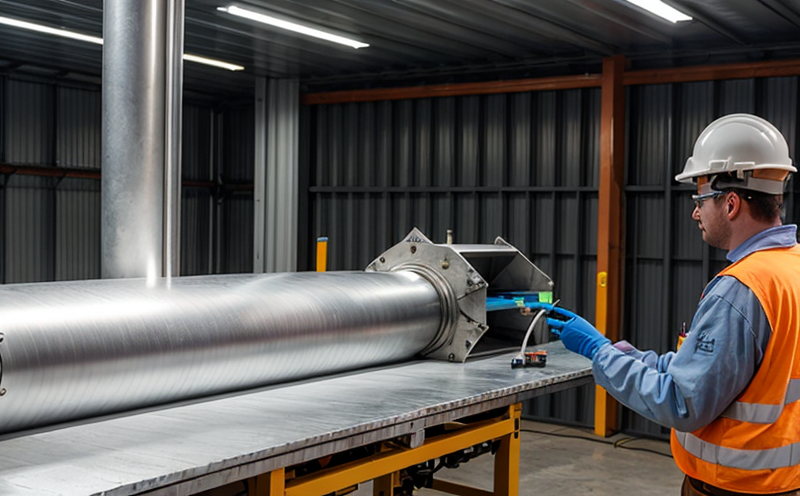ISO 17640 Ultrasonic Testing of Renewable Components
The ISO 17640 standard provides a robust framework for the ultrasonic testing (UT) of materials and components used in renewable energy applications. This service ensures that critical parts, such as turbine blades, gears, and structural elements, meet stringent quality assurance criteria to prevent failures that could compromise safety and operational reliability.
The process involves the use of high-frequency sound waves to detect internal flaws or anomalies within the material structure without causing damage. Ultrasonic testing is particularly beneficial for inspecting large components where other non-destructive testing methods may be impractical or less effective. The ISO 17640 standard specifies the criteria and practices that ensure consistent, accurate, and reliable results.
Our laboratory adheres strictly to this international standard, providing comprehensive ultrasonic testing services tailored to the unique requirements of renewable energy components. Our team uses advanced equipment and follows precise procedures to identify potential defects early in the manufacturing process or during routine inspections. This proactive approach helps prevent costly downtime and ensures compliance with industry regulations.
For quality managers and R&D engineers, ISO 17640 testing offers invaluable insights into material integrity that can inform design improvements and enhance product longevity. Compliance officers will appreciate our adherence to international standards, ensuring their organization remains in line with regulatory requirements. For procurement professionals, this service supports the selection of high-quality materials by verifying supplier commitments.
The process typically involves preparing specimens according to ISO 17640 specifications, calibrating probes and equipment, and conducting scans across specified areas of interest. Reporting follows the standard’s detailed guidelines, providing clear documentation of findings that can be used for decision-making purposes.
- Materials tested include metals like stainless steel, aluminum alloys, and composite materials often found in renewable energy applications.
- Components inspected might range from small parts to large structures depending on the specific application requirements.
The ISO 17640 standard emphasizes non-destructive evaluation techniques that are crucial for maintaining operational integrity. By leveraging ultrasonic testing, we provide a balance between thoroughness and efficiency, ensuring that every component receives the necessary scrutiny without impeding production schedules or project timelines.
This service is especially important in sectors where reliability and safety are paramount, such as wind energy, solar power systems, and hydroelectric installations. Ultrasonic testing helps maintain high standards of quality and reliability, which are essential for the continuous operation of these complex systems.
Benefits
The implementation of ISO 17640 ultrasonic testing offers several key advantages to stakeholders in renewable energy applications:
- Enhanced Reliability: By detecting internal flaws early, we help prevent failures that could lead to downtime or accidents.
- Cost Efficiency: Early detection of defects allows for timely repair or replacement, minimizing unexpected maintenance costs.
- Compliance Assurance: Adherence to international standards ensures that all testing meets regulatory and industry requirements.
- Informed Decision-Making: Detailed reports provide valuable data points that support strategic decisions regarding product design and supplier selection.
The ISO 17640 standard promotes a culture of quality and safety within renewable energy projects, contributing to the overall success and sustainability of these initiatives.
Quality and Reliability Assurance
- Calibration: All ultrasonic testing equipment undergoes rigorous calibration before each use to ensure accuracy.
- Data Validation: Multiple readings are taken and validated against ISO 17640 acceptance criteria to confirm results.
In this section, we delve deeper into the technical aspects of our quality assurance processes. Our team ensures that every aspect of ultrasonic testing adheres strictly to the ISO 17640 standard. This includes maintaining a clean and controlled environment for specimen preparation, using appropriate calibration standards, and employing skilled personnel who are thoroughly trained in UT procedures.
The process begins with meticulous specimen preparation according to the requirements outlined in the standard. This involves cleaning surfaces, marking inspection areas, and ensuring that specimens are free from external factors that could interfere with testing results.
During the actual testing phase, our technicians apply coupling agents between the probe and the surface being inspected to reduce signal loss. Probes are carefully positioned over identified regions of interest, and high-frequency sound waves are transmitted through the material. These waves reflect back when they encounter differences in density or composition, creating images that highlight any potential defects.
Data collection involves capturing these reflected signals, which are then analyzed against predefined acceptance criteria specified by ISO 17640. Any anomalies detected fall below acceptable limits, triggering further investigation and possible corrective actions.
Our rigorous quality assurance measures extend beyond the testing itself. We maintain detailed records of all tests conducted, including calibration data, inspection results, and any subsequent repairs or replacements required. These documents are readily accessible for internal review and external audits if necessary.
Environmental and Sustainability Contributions
The ultrasonic testing services provided under ISO 17640 contribute significantly to environmental sustainability in renewable energy applications by promoting the use of high-quality materials that are reliable over extended periods. This reduces waste associated with frequent replacements due to substandard components.
- Emissions Reduction: By ensuring longer component lifespans, we help reduce emissions from decommissioning and replacement processes.
- Resource Efficiency: High-quality materials contribute to more efficient energy conversion rates in renewable systems, leading to lower resource consumption overall.
The adherence to ISO 17640 standards not only enhances the performance of renewable energy devices but also supports broader sustainability goals by fostering innovation and best practices in material selection and testing. Our commitment to these principles aligns with global efforts towards greener technologies that minimize environmental impact while maximizing efficiency.





